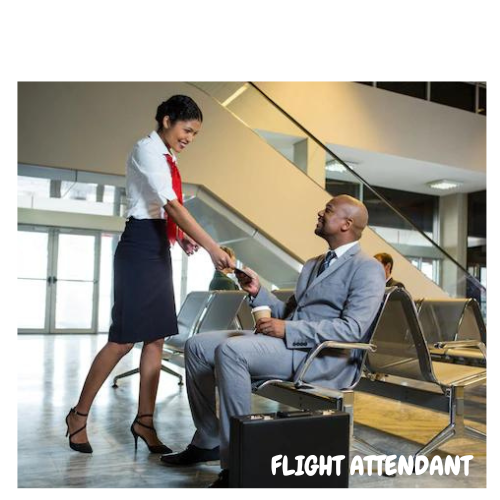INTRODUCTION
FLIGHT ATTENDANT

A flight attendant is a precious part of the air trip experience. They give passengers a safe, comfortable, and pleasurable trip. From icing the safety of passengers to furnishing exceptional client service, flight attendants are a crucial element in the success of airline assiduity. Flight attendants are devoted professionals who are passionate about their work and strive to make each flight an affable experience for everyone onboard. They’re knowledgeable, educated, and can frequently handle any situation that may arise. Their presence is essential to the smooth handling of the flight, and they insure that each passenger has a safe, pleasurable, and stress-free flight.
JOB DESCRIPTION
A Flight Attendant’s job description is to give excellent client service to passengers before, during, and after a flight. Cabin Crews are responsible for icing passenger safety on the aircraft and in their assigned areas, furnishing passengers with information on airline programs, preparing the cabin for take-off and wharf, and furnishing backing to passengers during extremities.
Cabin Crew must be suitable to communicate easily and effectively with passengers, crew, and other staff. They must be suitable to work singly and remain calm in stressful situations. Flight Attendants must also be suitable to give medical backing to passengers as well as first aid.
Cabin Crew must have a comprehensive understanding of airline safety regulations and procedures. They must be suitable to demonstrate proper use of safety outfits and be familiar with exigency evacuation procedures. Flight Attendants must be suitable to give passengers detailed information on flight schedules, flight detainments, and cancellations.
Flight Attendants must be polite, patient, and professional. They must be suitable to work flexible hours, including nights, weekends, and leaves. Flight Attendants must be suitable to lift and carry heavy luggage, and must be suitable to stand for long ages of time. They must also be suitable to pass a background check and medical test.
QUALIFICATION
Flight attendants are the face of an airline, so they need to be friendly, professional, and approachable. A flight attendant should have excellent client service chops, strong communication, and interpersonal capacities, as well as good problem- working chops.
The minimal conditions to come to a cabin crew include a high academy parchment, good health, and the capability to pass a background check. numerous airlines also bear flight attendants to have valid passports, and motorist’s licenses and be willing to travel.
Cabin crews must also be suitable to comfortably lift and carry luggage, understand and speak a foreign language, and have the capability to work in a fast-paced terrain.
In addition to the introductory conditions, cabin crews must also be suitable to pass the airline’s training program. This program can include safety and exigency procedures, client service and communication, as well as food and libation service.
Cabin crews must also be of a certain age, generally between 18 and 65, and in some cases, be suitable to swim.
Having a council degree isn’t necessary, but it may give you an advantage over other campaigners. Airlines also prefer flight attendants with previous client service experience and an understanding of introductory aeronautics language.
TRAINING CONDITIONS
Cabin crews are a vital part of the aeronautics assiduity and serve an important part in icing the safety and comfort of passengers. In order to come a flight attendant, it’s necessary to have a certain set of chops and qualifications.
Before being hired, all flight attendants must go through a rigorous training program. This program generally includes both classroom and in-flight instruction. In the classroom, attendants will learn about the different types of aircraft, safety procedures, client service, and exigency procedures. They will also admit training in first aid, food and libation service, and other aspects of the job.
In-flight instruction will include how to perform safety checks, how to handle a variety of situations, and how to interact with passengers. Attendants will also learn how to use the aircraft’s safety and exigency outfit. During this time, they will also be trained in how to deal with delicate passengers and how to remain calm in their extremities.
Flight attendants must also be well-clued in the programs and procedures of the airline they will be working for. They must also be suitable to read and understand the airline’s primer, which outlines the duties and liabilities of the attendants.
Once the training is complete, flight attendants must also pass a medical and cerebral test to prove that they’re physically and mentally fit for the job. This test will also examine their knowledge of safety and exigency procedures.
To come to a successful cabin crew, individualities must retain excellent communication, client service, and problem-working chops. They must also be suitable to remain calm and composed in stressful and chaotic situations. Attendants must also be suitable to suppose snappily and make opinions in order to insure the safety of passengers and crew.
WORKING CONDITION
Working conditions for cabin crews can vary extensively depending on the company and the type of breakouts. Generally, flight attendants must be willing to work long hours, with irregular shifts depending on the flight schedule. Depending on the airline, attendants may be needed to be down from home for extended ages of time and may have to work in a variety of climates and time zones.
Cabin crews are anticipated to give excellent client service, be knowledgeable about safety and security procedures, and handle extremities adeptly. They must be suitable to communicate effectively in multiple languages and maintain a professional appearance at all times. Attendants are also anticipated to be suitable to lift and carry heavy luggage and outfit, as well as move snappily and efficiently through the cabin.
Flight attendants are generally handed a comprehensive benefits package, including holiday time, health and withdrawal benefits, and abatements on air trips. still, due to the long hours and changeable work schedule, numerous flight attendants find themselves floundering to fit in their particular commitments.
PAYMENT AND BENEFITS
Flight attendants are responsible for icing the safety and comfort of passengers during air trips. They’re also responsible for furnishing client service to passengers, including furnishing information on breakouts, responding to passenger inquiries, and resolving any client service issues that may arise. Cabin crews generally admit a payment and benefits package that includes health insurance, holiday time, and other gratuities.
Flight attendants are generally paid an hourly rate, which varies depending on the airline. The average hourly rate for flight attendants ranges from$ 14 – $29 per hour, depending on the airline and the number of times of experience. Flight attendants also admit overtime pay for any hours worked beyond the standard 40- hour workweek.
In addition to their hourly rate, flight attendants generally admit a benefits package that includes health insurance, a 401( k) withdrawal plan, and paid holiday time. Cabin crews may also admit fresh benefits similar to free or blinked breakouts, access to field couches, and abatements on hospices, rental buses, and other trip charges.
Flight attendants are also entitled to certain labor rights, similar to the right to collaborative logrolling and the right to union representation. Cabin crews also have the right to be free from demarcation and importunity at work, and they’re defended from employer retribution for reporting unsafe working conditions or other violations of their labor rights.
CAREER ADVANCEMENT
A career as a Flight Attendant offers numerous openings for career advancement. With the right station and performance, Flight Attendants can advance to advanced situations of responsibility and advanced hires.
One of the stylish ways to advance in the Flight Attendant career is to develop a trusted character with the airline. Airlines are always looking for Flight Attendants who are dependable, professional, and knowledgeable. By showing an employer that you’re committed to the job and willing to go the redundant afar, you can demonstrate your value and open up openings for growth.
A great way to demonstrate your commitment is to constantly strive for excellence in your work. This means showing up to work on time, following directions, and going beyond the call of duty when necessary. also, take time to stay up to date on the rearmost assiduity news and safety protocols. Doing so can help you come to a more precious asset to the airline.
Flight Attendants can also advance their careers by seeking out fresh training openings. numerous airlines give courses and forums to help Flight Attendants stay informed and increase their skill sets. By taking advantage of these learning openings, Flight Attendants can gain fresh knowledge and demonstrate their fidelity to the profession.
Eventually, Flight Attendants can advance their careers by seeking out elevations. Airlines frequently offer elevations to those who exceed in their jobs and demonstrate strong leadership chops. By working hard and developing a strong foundation of knowledge, Flight Attendants can put themselves in a position to take on further responsibility and open up new avenues for growth.
With the right station and performance, Flight Attendants can advance their career and take on further liabilities. By developing a strong character with the airline, taking advantage of fresh training openings, and seeking elevations, Flight Attendants can open up more openings for growth and success.
CONCLUSION
The job of a flight attendant is demanding and satisfying bone. Flight attendants are responsible for icing the safety and comfort of passengers while in the air and on the ground. They give backing with everything from marking to cabin services and help ensure an affable and comfortable flying experience. They must have excellent client service chops, a good understanding of safety regulations, and the capability to remain calm and composed in stressful situations.
Overall, being a flight attendant is a great job for those interested in trip and client service. It’s a job that requires fidelity and hard work, but with the right station and training, it can be a veritably satisfying career. Flight attendants have the occasion to meet new people, explore new places, and make a difference in the lives of passengers. It’s a job that truly offers a commodity that no other job can.


0 Comment